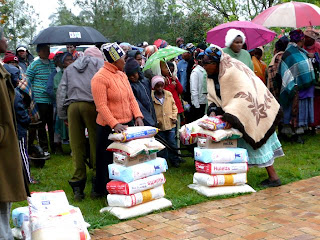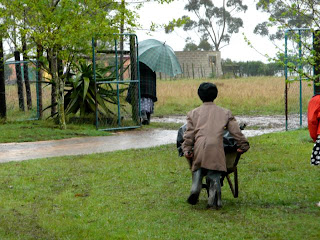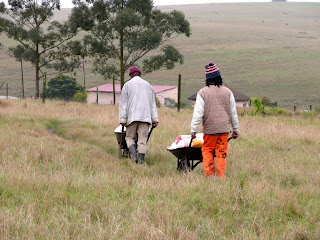Thursday was a day of contrasts, from absolute sadness to joyful elation.
Imagine the worst gravel road you've ever driven on. Add potholes and rocks the size of your fist (or larger). Then, for good measure, have it rain. Now, imagine 20 miles of this, sick in an ambulance, heading to a place you don't want to go to. You've just experienced a trip to the local hospital for Malungeni and the surrounding villages.
(During the ride I was amazed to see many children walking to school barefoot. Now, there was a steady drizzle or light rain and the temperature was only about 55 F. The water in the puddles and on the grass on the roadsides had to be cold. But, it's likely that these children did not own shoes, or that they had to share with someone else in the family. Spiwo told me once that he didn't get his first pair of shoes until grade 6 (age 12), and Xolani was 15 before he had his own pair. I cannot imagine sitting in school all day with cold feet, but that's another aspect of reality in Malungeni.)
Canzibe Hospital is a government hospital. It was built in the 1960s and was probably somewhat up-to-date back then. Unfortunately, almost nothing has changed in the place since then, except over 40 years of use and deterioration. It is probably the worst health care facility I've ever seen, including hospitals in about 10 other countries.
The hospital campus houses the hospital proper, a tuberculosis (TB) ward (separated from the mail hospital for infection control), an outpatient clinic, and an HIV clinic. There are also separate buildings for physical therapy (PT) and rehab, and a dormitory for staff (since most of them live quite a distance away and don't have transportation). None of the buildings are connected, so if a patient needs to move from the hospital to PT they must travel outside down an unpaved path (kind of like the road), rain or shine, hot or cold. It had been raining for two weeks straight before we arrived and every piece of ground was mud. I cannot imagine having to maneuver the paths in a wheelchair.
We started our tour by meeting the hospital manager and a couple members of her staff. I'm not sure who they thought we were, but we were treated like honoured guests. (I don't know why. We showed up unannounced and explained that we just wanted to look around. Was it the foreign accent?) She assigned the nursing director to take us around and encouraged us to ask questions. I didn't take any pictures, more out of respect for the patients than anything. I now wish I had.
We started in the TB ward. This building has 8 patient rooms:
- 1 for children that holds about 6 cribs
- 3 for women, including 1 room for acutely ill people (8 beds) and 2 rooms for people who are "better" and soon to be discharged (8 beds each)
- 3 for men, with the same configuration and bed counts as the women
- 1 isolation room for people with multi-drug resistant (MDR) or extensively drug resistant (XDR) TB (6 beds)
Of the 60 total beds, 46 were occupied. There were only 2 children and no isolation cases, and most of the adults were in the "getting better" wards.
The wards are nothing more than large open rooms with beds positioned about 3 feet from each other. The two post-acute wards are separated only by a short wall, maybe 5 feet high. There are no curtains between the beds, so privacy is non-existent. There's no TV or radio, save a single TV set under the door as you enter the building. If you're lucky enough to feel good, you can sit in the hallway and watch a fuzzy showing of a soap opera or the news. If you don't feel good, you're stuck in your bed with only your thoughts to keep you company. All of the equipment in the wards is old and probably original. It is in such bad shape that much of it has Condemned written in it. I wondered if that label was really more applicable to the patients.
One other interesting thing was that all of the windows were wide open. Again, it was cold and rainy that morning. The wards were filled with sick people, many with suppressed immune systems (I'll estimate that at least half of the patients also have HIV), bundled up to their eyeballs to avoid the chills. I'm assuming they needed the airflow for odor control, but it couldn't have been helping the treatment too much.
We also got to see the kitchen. The TB ward has its own so that no food or equipment is passed back to the main hospital. It was horrible. Most of the equipment doesn't work. There were two stoves that were non-functional, and the one that did work only had 4 working burners out of 6. The sick was small and in a rotting cabinet. The pantry was small and pretty bare. People were just finishing breakfast when we were there - it was a plate of gray-tan porridge. Oliver Twist would have passed.
Before we moved on we were asked to wash our hands to avoid contaminating the other areas. Great idea. Of course, we couldn't dry them since there were no towels. One of the nurses jokingly said, "We air dry our hands here." It doesn't say much for infection control when you either can't get the germs off or they end up on your pants legs.
Next stop: the main hospital building. This houses the casualty department (i.e., the ER), x-ray, the lab, and the pharmacy. There is also an outpatient clinic for people with TB and a dental room. Casualty was small, 4 rooms, but fairly well stocked with equipment. There were two doctors there, both from outside South Africa (I was told that the longest a South African doctor has ever stayed there is 11 days. Yes, days.) It also has a small outpatient surgery area where they do circumcisions and some minor gynecological procedures (yes, abortion is legal here).
The x-ray department is the most state-of-the-art area due to the recent delivery of new stationary and portable x-ray equipment. It was all labeled "A Gift from the People of Japan" which tells me the government didn't buy it. All of the x-rays can be digitally scanned for storage and reading. The x-ray technician was very proud of his equipment and explained in great detail how he lays people down and takes their pictures. Unfortunately, if you need an x-ray after 5:00 pm or on the weekends you're out of luck. The department is closed. You can come back in the morning or on Monday.
The lab was also fairly modern. They can do basic chemistries (glucose, electrolytes, pregnancy) and some microscopy. The rest they send out and wait about a week for the results. They have a brand new machine that will more than double their capabilities, but it has not yet been calibrated and validated. The manager was confident that it would happen very soon.
The pharmacy was small, about 8 feet by 12 feet. There were two people there, a full-time pharmacist and a volunteer from the Netherlands who was working there for a few months. They had everything we have at Brown's Farm CHC, just less of it. They had taken over an old church building on the campus for storage so they may have had plenty of inventory. Unfortunately, patients have to wait outside for their medications, and there is no space available for counseling. I'm sure compliance is poor, as it is at Brown's Farm (even with our attempts at education. Well, at least I try).
After we finished there we headed for the hospital wards. Their small building houses the main surgical suite, the main kitchen, and six wards:
- men's medical (6 beds)
- men's surgical (6 beds)
- women's medical (6 beds)
- women's surgical (6 beds)
- pediatrics (6 beds)
- maternity (3 beds)
The medical and surgical wards were as spartan as the TB wards. Most of the patients looked as if they didn't want to be there, in a bad way. The pediatrics ward was a little bit better, only because the mothers got to be with their children so the kids were calm. But it was the maternity ward that got me.
The unit is split into two areas. One is the labor and delivery unit, and the other is the ward for mothers who have problem pregnancies. The ward is colourful, only because the beds actually have salmon-coloured bedspreeds. One of the nurses said it was the only ward that the government cares about, since women and children are a big focus for the health department right now. The labor and delivery area has three beds that serve as the pre- and post-delivery area and three beds in the birthing room. Only one of the birthing beds is actually the right model, but they make do with the ones that aren't.
The birthing procedure is very different in the government hospitals. Mothers usually arrive in labour. Hopefully they had some kind of antenatal (pre-natal) care, but in half the cases there was none. They are quickly tested for HIV so that drugs can be given if necessary to protect the baby. They wait until they're ready to give birth and are then moved into the birthing room. Many women deliver standing up or squatting, so the beds are shorter and higher than normal. after the baby is delivered, mother and baby are moved together into the post-delivery area. They stay there for 6 to 8 hours, during which time they are taught to breast feed (if they can - HIV-positive women are discouraged from doing so). If everything is okay at that point, they are sent home. There's no mandatory 24-hour stay, no baskets of goodies or balloon bouquets. It's time to put the baby in a carrier and walk back to the village.
The unit delivers about 8-10 births a day, so it's not unusual for all of the beds to be full. In fact, if women come in September or October, the busy time of the year, some of them will be delivering in the hallway. Needless to say, it's not an ideal set up.
The other thing that got me about the maternity unit was the horrible bathroom conditions. The doors on the toilet rooms were broken and hanging on one hinge. The toilets lacked seats (which is pretty common here) and toilet paper was usually absent. The shower facilities were so dirty and moldy that I wouldn't risk using them. I don't know what these women would think about the single-room birthing suites that most U.S. hospitals have. They'd probably want to move in permanently.
The last stop on our tour was the HIV clinic. This comprises two trailers, each about the size of a big semi truck trailer and configured into three small treatment rooms. The waiting area is outside between the two trailers. The clinic sees about 30-50 patients a day, more on the days medications are passed out. They have 190 patients on anti-HIV medications, which is a good number but probably only 20% of what they should have. Most patients are not seeking care, some because they're scared, some because they don't know to, and some because they believe in traditional medicines. Thus, the infection keeps being passed on and people keep dying by the scores.
In short, I'm glad I saw Canzibe but I was more glad I could leave. It is truly a depressing place, one where most people just go to die. There are two other hospitals serving the villages around Mthatha, and the situation is no better at them. The nurses are demoralized, there is a constant staff shortage and supplies are very difficult to come by. I asked when last a health department official was there and the nursing director told me no one has ever been there. If they came they might know how bad it is and be compelled to do something about it.
Or, it's more likely they'd just ignore it like they have at other hospitals. There was a major scandal at a hospital not far from Mthatha where the rate of infant deaths was exceedingly high. The person who reported it was fired, and the deputy minister of health was let go after she went there unannounced to investigate. There is no political will here to fix the problems with the public health facilities, and people will continue to die as a result.
After another long, bumpy ride we arrived back at the house. It was now time to head into Mthatha and make sure everything was lined up for the food parcels. Spiwo still hadn't found a truck, so that was top on the list. He wanted to first stop at a hardware store and check on windows for the new church, so we went to a local supplier. There in the parking lot was a truck for hire, just like it was waiting for us. The only concern was that it was an open bed truck and it was raining. But, we made a plan and bought a plastic sheet to cover everything. It was all set.
After checking on the windows we went to the food store. As we drove in the parking lot, Spiwo spotted another truck for hire, this one with an enclosed bed. It was available, and actually cheaper than the other. We worked out an arrangement with the first truck and they left. So everything worked out there. Not quite the same story inside. To Spiwo's shock, nothing had been pulled yet. The manager on duty didn't even know about our order. They got it figured out, though, and we left feeling okay that it was going to work. Back to the ranch.

A few hours later, the truck arrived. We had ordered 72 of the following:
- 12.5 kg (27 pounds) of flour
- 12.5kg of samp (a form of whole-kernel corn used like beans)
- 12.5 kg of mealie meal (corn meal)
- 10 kg (22 pounds) of sugar
- 12.5 kg of rice
- 5 kg (11 pounds) of beans
- six-pack of long-life milk (the kind that comes in a box)
It was a ton of food. Actually, six tons. These parcels would feed a typical family for 2 to 4 weeks, which was a long time when a food supply was not guaranteed.


Using a fire brigade line, we had the truck unloaded in about 20 minutes. By the time we were done people were starting to queue up for the 4:00 start time. There was a sense of celebration in the air, even with the drizzle. At 4:00 Spiwo started reading names, and a group of local boys would make a pile of the various items (the had it all choreographed so that the pile would be exactly the same in every case). It was then up to the recipient to figure out how to get it home.
It was actually fun to watch. A large number of wheelbarrows had miraculously materialized,


and most people loaded up their items and walked off. Others brought along a group of friends or family and simply divided the load. A number of women carried items on their heads, just like you see in National Geographic. I tried doing this with the bag of samp, helping a woman who lived about 200 yards up the road. It took all of my balancing ability to not fall over. She carried two items on her head, and even managed to pick up her baby halfway up the road. I was in awe.
After 40 minutes, it was all over. Only three parcels were left over, from people who didn't come. Their food would go to others in need.
We had a guest for dinner that night. Spiwo had met Francis a few years ago. He's a magistrate in the Eastern Cape, similar to what we'd call a district attorney. He was born into a very poor, dysfunctional family. His mother left when he was a young boy and he never knew her. His father was around but not a large part of his life. He was raised by his grandmother, along with a couple other children. His grandmother had a fruit stand outside the courthouse in their city, and Francis used to help her before and after school. He said he used to watch the men in their robes and wonder what it would be like to be one of them. His grandmother constantly encouraged him and made sure he finished school. He struggled to get accepted to university, but with a tenacious spirit he managed to get in and be accepted to the law track.
His first day at work came before he actually graduated. He only went to ask for a job. It so happened that there was a crisis in the court that day and no prosecutors were on duty. The woman in the office asked him if he was really a lawyer, and when he showed her his transcripts she said to "go home and get your robe and report for work." He was trying cases that afternoon. In the very same courthouse outside which he once sold fruit. In the very same robes that his idols wore. He was ultimately promoted to magistrate and now manages the district that Mthatha is in.
His story was very inspirational. Spiwo is trying to being him to Cape Town to speak at church. I would be happy to hear his story again.
After dinner it was time again for reading and sleeping.
Next up: Finishing up and heading home.